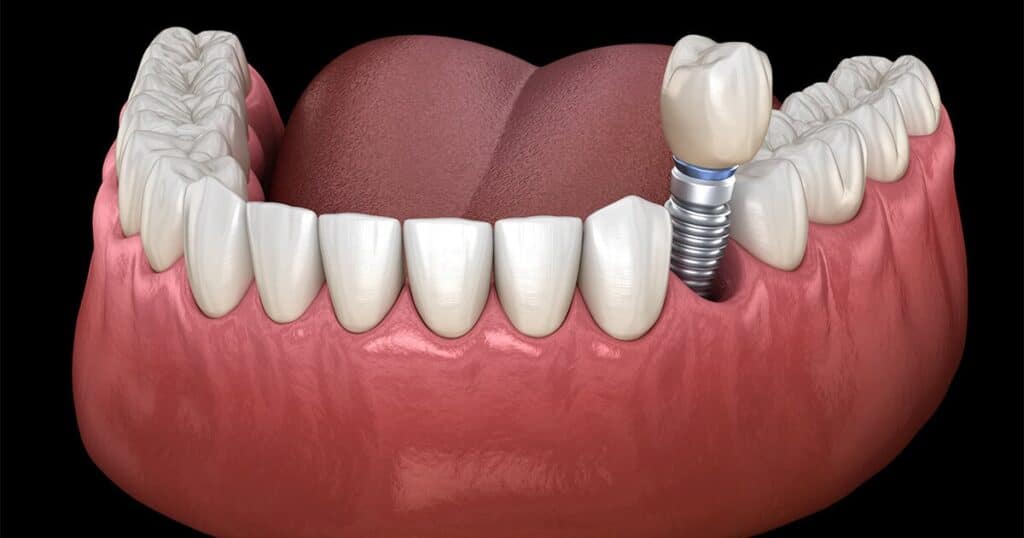It begins with a wiggle—a small one, initially. However, with time, that formerly solid dental implant doesn’t feel right anymore. Panic sets in. Is this an indication that the implant is failing? Is it an emergency at the dental clinic? Do you need to call an emergency dentist right away? If these are the questions running through your head, you’re not alone. A loose dental implant is something not to be overlooked, but it’s a full-on emergency only if it happens for a reason that requires immediate attention. Let’s sort it out so you understand clearly what to do next.
Why Do Dental Implants Loosen Up?
A well-placed dental implant integrates with your jawbone as time passes, forming a stable foundation. But when that connection is compromised, the implant begins to shift. Here’s why that can happen:
- Healing Problems: Following placement, implants undergo osseointegration, during which they integrate with the jawbone. If osseointegration is interrupted, the implant can become loose.
- Bone Loss: Osteoporosis or chronic gum disease can cause bone loss, which will cause the implant to become loose over time.
- Infection (Peri-Implantitis): Bacterial infection of the area around the implant can destroy the bone around the implant, making it loose.
- Mechanical Issues: The screw, abutment, or crown holding the implant in place can loosen over time.
- Excessive Bite Force: Grinding your teeth (bruxism) or eating hard foods can put too much stress on the implant, causing instability.
Is a Loose Dental Implant a Dental Emergency?
Not every case is an emergency, but some are. Here’s how to know:
Emergency: Call an emergency dentist in Manvel ASAP if:
- You have extreme pain, swelling, or bleeding.
- There is infection, such as pus or a bad taste.
- The implant feels like it’s loose or in danger of falling out.
Urgent, But Not an Emergency: You should have a dental appointment soon if:
- The implant is slightly loose but doesn’t hurt.
- The abutment or crown is loose, but the implant itself is stable.
- You see some gum irritation but no infection.
Ignoring a loose dental implant can create bigger issues. If you’re not sure, it’s always better to get examined earlier than later.
What To Do If Your Implant Becomes Loose?
If your dental implant begins to move, this is what you should do before visiting your dentist:
- Don’t Wriggle It: The more you move it, the worse it becomes. Don’t touch or check its looseness.
- Remain on Soft Foods: Stay away from hard, crunchy, or sticky foods that can make the situation worse.
- Look for Signs of Infection: Redness, swelling, and discharge indicate you need to seek attention right away.
- Rinse with Salt Water: It may help to minimize bacteria and irritation.
- Wear a Mouthguard While Sleeping: If grinding is the cause, a mouthguard will help avoid additional damage.
Treatment for a Loose Dental Implant
The appropriate treatment is based on the etiology of the issue:
- Loose Abutment or Crown: Simply tightening or replacement can be done.
- Minor Infection: Deep cleaning, antibiotics, and good oral hygiene may prevent further issues.
- Severe Infection or Bone Loss: If the harm is too extensive, the implant must be extracted and replaced after bone grafting.
- Bite Adjustments: If the cause is too much force, bite adjustments or a custom mouthguard may be required.
Can a Loose Implant Be Saved?
Occasionally, yes. If the implant itself is stable, but the abutment or crown is the problem, a dentist usually can correct it relatively quickly. But if the actual implant post is loose, therapy may be to extract it and let the site heal before it is replaced. The sooner you do it, the greater likelihood you have of saving the implant.
How to Prevent Dental Implant Problems?
Want to secure your dental implants for years to come? Simply follow these easy steps:
- Keep Your Oral Hygiene Excellent: Brush twice a day, floss once daily, and rinse with an antimicrobial mouthwash.
- See Your Dentist Often: Regular check-ups catch minor problems before they become serious.
- Guard Against Grinding: If you grind your teeth, a night guard will save your implant from too much pressure.
- Eat Better: Limit hard chewing on ice or nuts.
- Quit Smoking: Tobacco use weakens the bone and gums, increasing the risk of implant failure.
Worried about a loose dental implant? Don’t take the risk. Contact our dental office today and have our experts examine your situation. Whether a minor adjustment or more serious complication, we’ll get you into the proper care to get back that confident smile of yours.
Your health is too vital to neglect—get your implant on track again!

